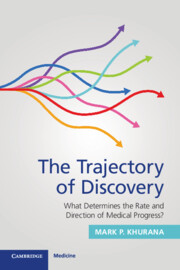
-
Select format
-
- Publisher:
- Cambridge University Press
- Publication date:
- April 2023
- April 2023
- ISBN:
- 9781009354424
- 9781009354431
- Dimensions:
- Weight & Pages:
- Dimensions:
- (234 x 156 mm)
- Weight & Pages:
- 0.27kg, 168 Pages
You may already have access via personal or institutional login
Book description
Medical research works in trajectories. Scientists and researchers must choose to pursue certain scientific pathways and omit others, limited by resources, attention, and time. The trajectory of medical progress is therefore characterized by two crucial characteristics: rate and direction. These two components form the foundation for this book - what are the forces that determine the rate and direction of progress in medicine? This book brings together the worlds of scientific policy, economics, sociology, philosophy, and innovation to describe why the world of medical research looks the way it does. The book also addresses fundamental contemporary issues in medicine, how they influence progress, and how we might improve medical research going forward. The contemporary issues discussed include: flawed incentive structures, a concentration of power and resources among few actors and disease groups, the potential distortionary effects of lobbying by different scientific actors, and missing novelty in drug development.
Reviews
‘With engaging examples and a surprising breadth of research, The Trajectory of Discovery, brilliantly illuminates how both the rate and trajectory of medical research rests on the incentives built into the scientific system and the social context in which research takes place. Khurana deftly applies a host of classical and new findings from across scientometrics, sociology of science, and the economics of innovation to the medical area and highlight why we (don’t) know what we (don’t) know. Through examples, theory, and empirical research, the book argues that discovery rests crucially on the aggregated choices of many scientists, whose actions are shaped by the social logic of scientific system - a logic that is not necessarily optimized for this endeavor. It will be a great read for social scientists interested in the intricacies of medical science, or doctors in search for explanations of why science works the way it does.’
Emil Bargmann Madsen - Postdoctoral Researcher, Danish Centre for Studies in Research and Research Policy, Aarhus University
‘The rate and direction of medical progress remain neglected topics for systematic study. Mark P. Khurana's The Trajectory of Discovery shines the spotlight on such issues and makes this what is likely to be the most important book on both biomedicine and science policy this year.’
Tyler Cowen - Professor of Economics, George Mason University
‘A compelling route into the contemporary world of science. With plenty of illuminating examples from biomedical research, Khurana gives us an insider’s view into how prizes, important discoveries, easily-accessible tools, funding bubbles, temporary emergencies and crises have long-term effect on what scientists study, and contribute to determine whether science will ultimately progress or sluggish. It shows how patients’ groups, philanthropic institutions, corporate lobbies and governments can have a say into what gets prioritized and discusses how some of the current obsessions of science, such as having positive findings, publishing first and cumulate citations pose additional frictions. The final portrait is a world where little room, if any, is left to academic freedom.’
Chiara Franzoni - Professor of Applied Economics, School of Management, Polytechnic University of Milan
‘This book is well worth the read, particularly for those heading into the research sector, but also for anyone curious about the history of medical discovery … Recommended.’
D. C. Stewart Source: Choice
Contents
Metrics
Altmetric attention score
Full text views
Full text views help Loading metrics...
Loading metrics...
* Views captured on Cambridge Core between #date#. This data will be updated every 24 hours.
Usage data cannot currently be displayed.
Accessibility standard: Unknown
Why this information is here
This section outlines the accessibility features of this content - including support for screen readers, full keyboard navigation and high-contrast display options. This may not be relevant for you.
Accessibility Information
Accessibility compliance for the PDF of this book is currently unknown and may be updated in the future.


